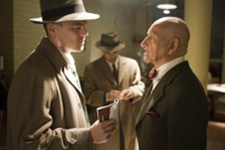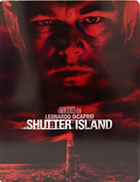Shutter Island (4K UHD)
|  Perhaps it was just a coincidence, but I find it interesting that Martin Scorsese followed The Departed (2006), his Oscar-winning crime saga, with Shutter Island, a psychological-thriller genre exercise that more than a few viewers and critics felt was beneath his cinematic prowess. I find this interesting because he did exactly the same thing 20 years ago when he followed GoodFellas (1990), arguably his masterpiece that should have cleaned up at the Oscars, with Cape Fear (1991), a psychological-thriller genre exercise that more than a few viewers and critics felt was beneath his cinematic prowess. That’s what I love about Scorsese: he refuses to be pigeonholed, even by those well-meaning souls who want to elevate his work to the status of “High Art.” At his core, in his soul, Scorsese is a genre filmmaker, nourished on classical Hollywood movies and first tested in the realm of low-budget indies; he loves nothing more than to take the familiar and make it his own, whether it be melodrama (1974’s Alice Doesn’t Live Here Anymore), the musical (1977’s New York, New York), or the religious epic (1988’s The Last Temptation of Christ, 1997’s Kundun). From that perspective, Shutter Island is the perfect Scorsese vehicle, as it allows him to take a well-worn genre (the psychological thriller with a crucial narrative twist) and remake it to his own strengths, which in this case involves atmosphere, tension, paranoia, and guilt, guilt, and more guilt. Based on the novel by Dennis Lehane, whose books have also provided the source material for Clint Eastwood’s Mystic River (2003) and Ben Affleck’s Gone Baby Gone (2007), Shutter Island is set in the mid-1950s and takes place almost entirely on the titular island, an intimidating, craggy rock about 11 miles off the coast from Boston where a former Civil War fort has been repurposed as an asylum for the criminally insane—the type of unhinged, violent offenders that can’t be handled anywhere else. Onto the island step federal marshals Teddy Daniels (Leonardo DiCaprio, in his fourth collaboration with Scorsese) and Chuck Aule (Mark Ruffalo), who have been sent there to investigate the strange disappearance of an inmate—or should I say “patient,” since that is the terminology insisted upon by Dr. Cawley (Ben Kingsley), the asylum’s chief psychiatrist who believes in the power of medicine to, if not heal, at least stem the demons of insanity. Teddy, who is the officer in charge (Chuck refers to him as “boss”), doesn’t seem particularly sympathetic to Dr. Cawley’s mission, and while he is intently focused on discovering the whereabouts of the missing patient, a woman who drowned her three children and refuses to recognize that she is in an insane asylum, we immediately get the sense that he has another agenda. Like many a Scorsese protagonist, Teddy is a tortured soul who is haunted by both the loss of his wife (Michelle Williams) in a fire and his experiences in World War II, particularly his role in liberating the concentration camp at Dachau. In both cases, he feels guilty for not being able to save people, which gives his search for the missing woman an underlying intensity that an otherwise routine missing persons case would lack. The manner in which Teddy bullies his way through the asylum, demanding information and challenging anyone who would stand in his way, makes him an intriguing and somewhat intimidating figure, even as his bluster comes across as compensation for his internal wounds. In this regard, DiCaprio is the perfect casting choice because, more so than just about any actor currently working, he is at his best when playing driven, tormented characters (you can see immediately why Scorsese has been drawn to him). To explain much more of the plot would potentially ruin the experience of Shutter Island, which suffice it to say is a film that will require more than one viewing to fully appreciate; small details that seem otherwise inconsequential, such as Chuck’s difficulty taking his gun off his belt or curious inconsistencies in Teddy’s various dreams and hallucinations, take on starkly different meaning once the true nature of story emerges. Screenwriter Laeta Kalogridis (Alexander, Alita: Battle Angel) structures the film as a straightforward mystery, but Scorsese’s elaborate visual style plays as a constant reminder that more is going on than meets the eye (even the musical score is fraught with ambiguity, particularly near the beginning when a wailing note at first seems to be the horn on a ferry). Although it has been sold as a horror film and has more than its share of ominous, Gothic-inspired creepy moments, Shutter Island is at its heart an exploration of internal torment and the lengths to which we will go to shield ourselves from its pain. This is all familiar thematic territory for Scorsese the auteur, as is a not inconsequential monologue near the end of the film by Ted Levine’s warden—yes, that’s Buffalo Bill who’s in charge of the inmates—about the inherent nature of human violence. Auteurists will certainly have a field day fitting Shutter Island into Scorsese’s oeuvre, and while there is much to be said about that approach, the film’s primary pleasures are in its atmospheric and narrative tensions, which Scorsese plays with a precise mixture of Hitchcockian suspense and Buñuelian surrealism, elevating what could have been a rote bit of narrative trickery into something not quite profound, but intensely engaging and quite moving.
Copyright © 2020 James Kendrick Thoughts? E-mail James Kendrick All images copyright © Paramount Home Entertainment | |||||||||||||||||||||||||||||
Overall Rating: 


 (3.5)
(3.5)


